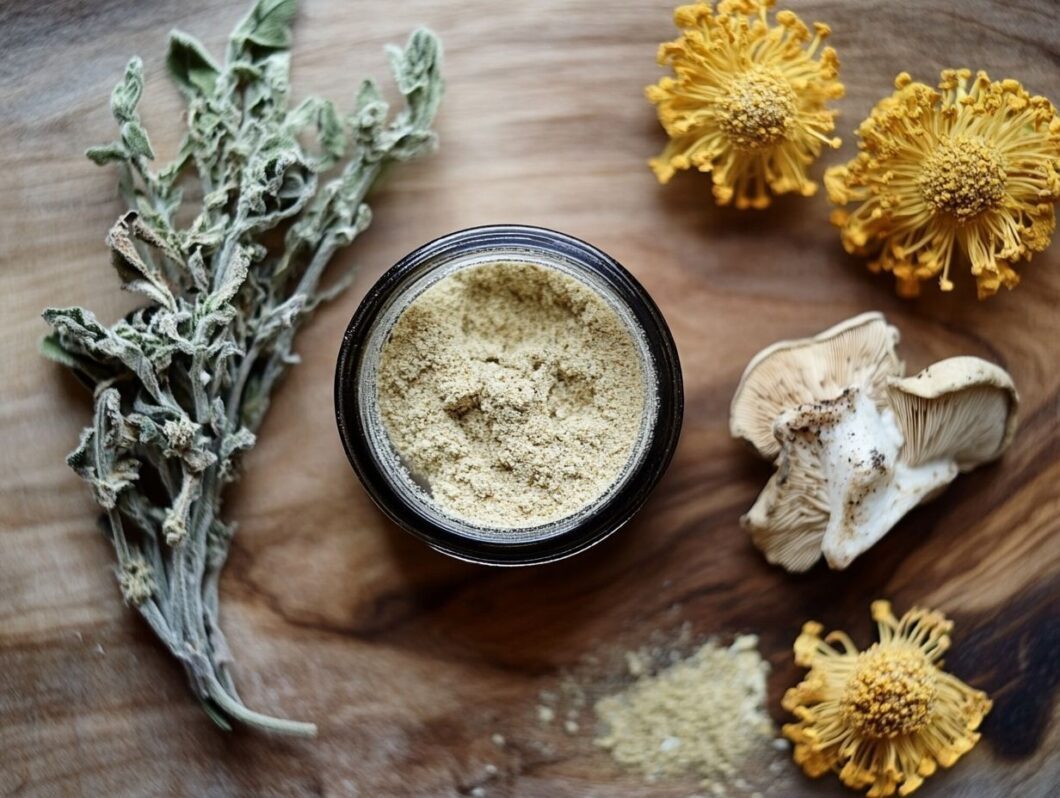In recent years, I have observed that adaptogens have gained considerable popularity as natural remedies for stress and wellness, and their benefits extend well beyond just mental clarity and relaxation.
These potent herbal compounds can significantly enhance skin health, effectively addressing common concerns such as dryness, acne, and signs of aging.
This article delves into what adaptogens are, how they function, and the specific advantages they provide for maintaining radiant skin.
Additionally, it offers practical tips for integrating these remarkable herbs into a skincare routine while also addressing any potential risks.
By exploring the transformative power of adaptogens, I aim to help others unlock the secret to healthier skin.
Key Takeaways:
Understanding Adaptogens
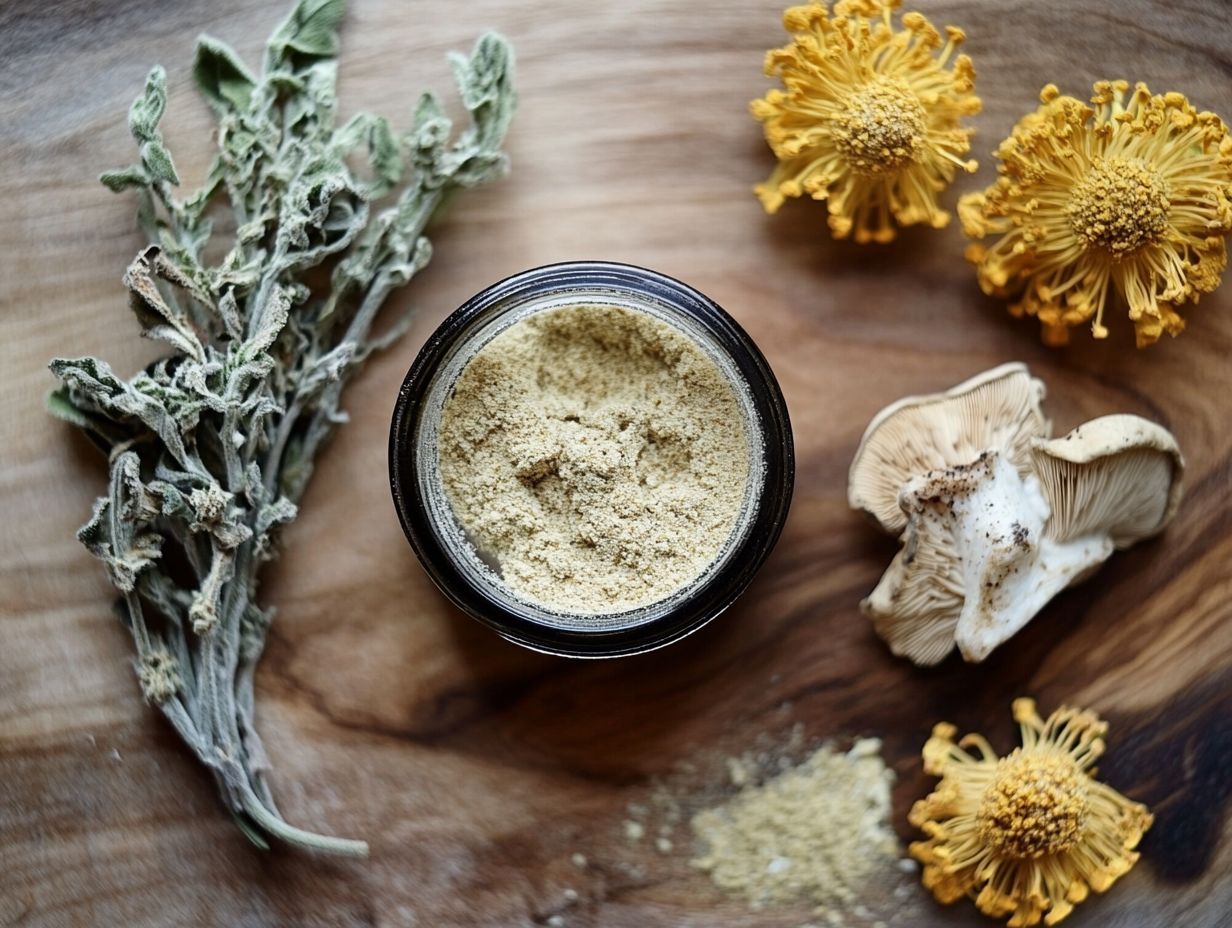
Understanding adaptogens necessitates an in-depth exploration of their distinct properties and the roles they fulfill in both traditional and modern herbal medicine. These natural substances, typically obtained from medicinal plants like Panax ginseng and Withania somnifera, are recognized for their capacity to enhance human resilience against various stressors, thereby promoting overall well-being.
I appreciate that adaptogens have been utilized for centuries in countries such as India and China, where they have been woven into the fabric of traditional medicine practices. Their phytochemical structures play a significant role in their antioxidant activities, making them a key focus of contemporary biomedical research.
What are Adaptogens?
Adaptogens are natural substances that assist the body in adapting to stress, promoting balance and homeostasis. I have found them in various medicinal plants that are widely used in herbal and traditional medicine.
These remarkable compounds function by influencing the hypothalamic-pituitary-adrenal (HPA) axis, which is integral to the body’s stress response. By modulating cortisol levels and enhancing resilience, adaptogens significantly bolster both physical and mental well-being.
Notable examples include ashwagandha, which is highly regarded in Ayurvedic practices for its calming effects, and Rhodiola rosea, known for its ability to combat fatigue and improve cognitive function.
Throughout history, cultures worldwide have utilized these plants not only for their health benefits but also as essential elements of their traditional healing practices, reflecting a rich tapestry of knowledge about their role in enhancing stamina and reducing anxiety.
How do Adaptogens Work?
I have found that adaptogens interact with the hypothalamic-pituitary-adrenal (HPA) axis, effectively modulating the body’s stress response. This interaction is crucial as it helps to reduce oxidative stress and enhance collagen production, both of which are vital for maintaining skin health.
Managing this modulation is particularly important because chronic stress can elevate cortisol levels, which are associated with inflammation and skin degradation.
Recent studies, including those published in the Journal of Ethnopharmacology, indicate that certain adaptogenic herbs, such as ashwagandha and rhodiola rosea, exhibit anti-inflammatory properties. These herbs may inhibit pro-inflammatory cytokines, potentially alleviating skin conditions like acne and eczema.
Additionally, their antioxidant activities are essential for neutralizing free radicals, which are well-known contributors to skin aging and damage. Research featured in the Journal of Cosmetic Dermatology suggests that these adaptogens might also promote skin hydration and overall health, unveiling a promising opportunity for natural skincare solutions.
Adaptogens for Skin Health
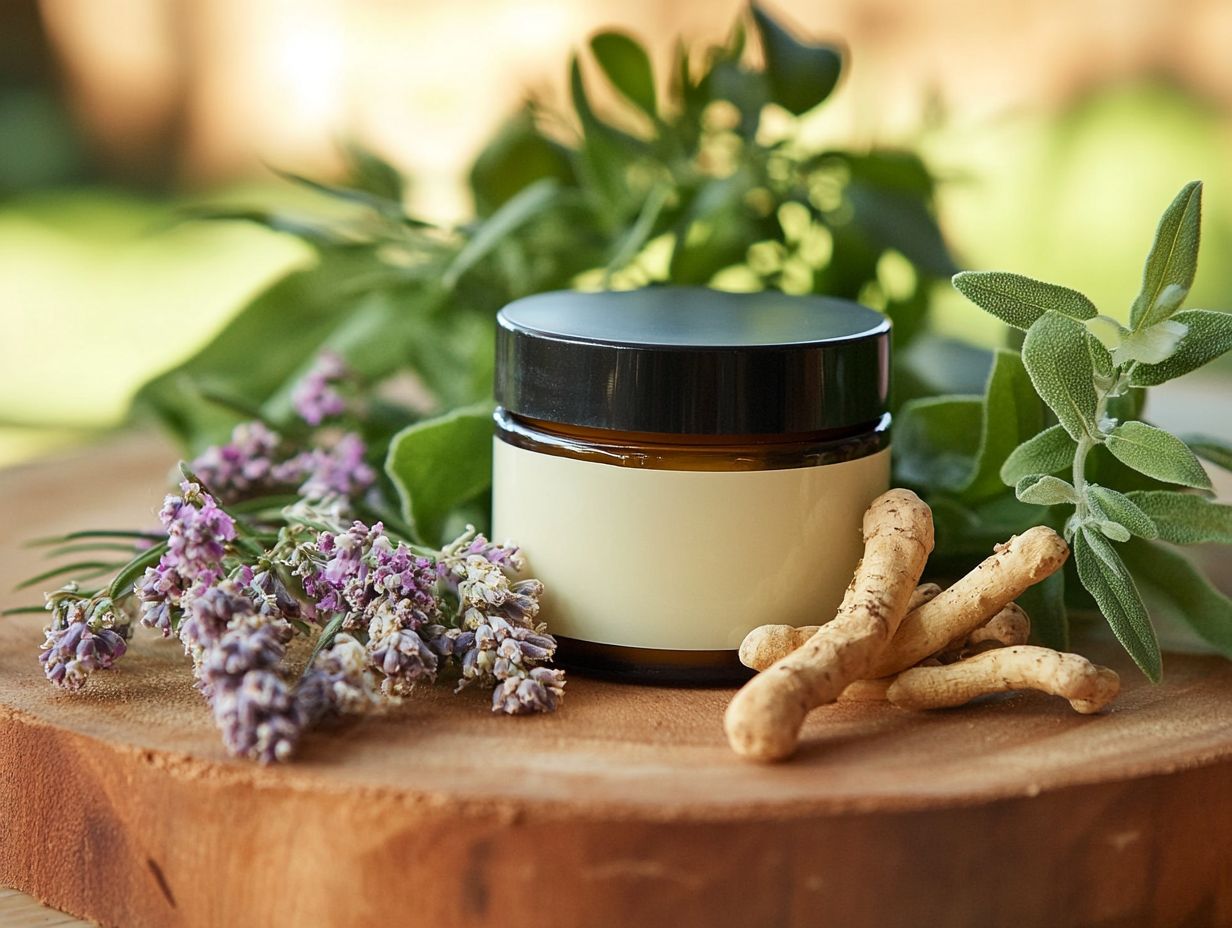
I recognize that adaptogens offer a range of systemic benefits, and they are also instrumental in promoting skin health. By addressing common skin conditions and enhancing overall skin appearance, their anti-inflammatory and antioxidant properties prove to be quite valuable.
I have observed that the topical application of adaptogens can be especially effective in treating issues such as psoriasis, eczema, and acne.
Common Skin Issues and Adaptogen Solutions
I have found that common skin issues such as psoriasis, eczema, and acne can be effectively managed through specific adaptogens known for their healing and anti-inflammatory properties.
These ancient herbs, widely celebrated in traditional medicine, have garnered attention for their ability to balance stress levels and enhance the skin’s resilience. For instance, Withania somnifera, commonly known as ashwagandha, is recognized for its potent antioxidant properties, which combat oxidative stress—a significant factor in skin aging and inflammation.
Similarly, Panax ginseng is highly regarded for its rejuvenating effects; it not only helps to soothe irritated skin but also enhances overall skin radiance. By integrating these adaptogens into skincare routines, I can adopt a holistic approach that nurtures both the mind and body while effectively addressing persistent dermatological concerns.
Other Health Benefits of Adaptogens
Beyond skin health, I recognize that adaptogens provide a wide range of additional health benefits, such as stress relief, improved immune support, and anti-aging properties.
This makes them valuable allies in my pursuit of holistic wellness.
Stress Relief and Immune Support
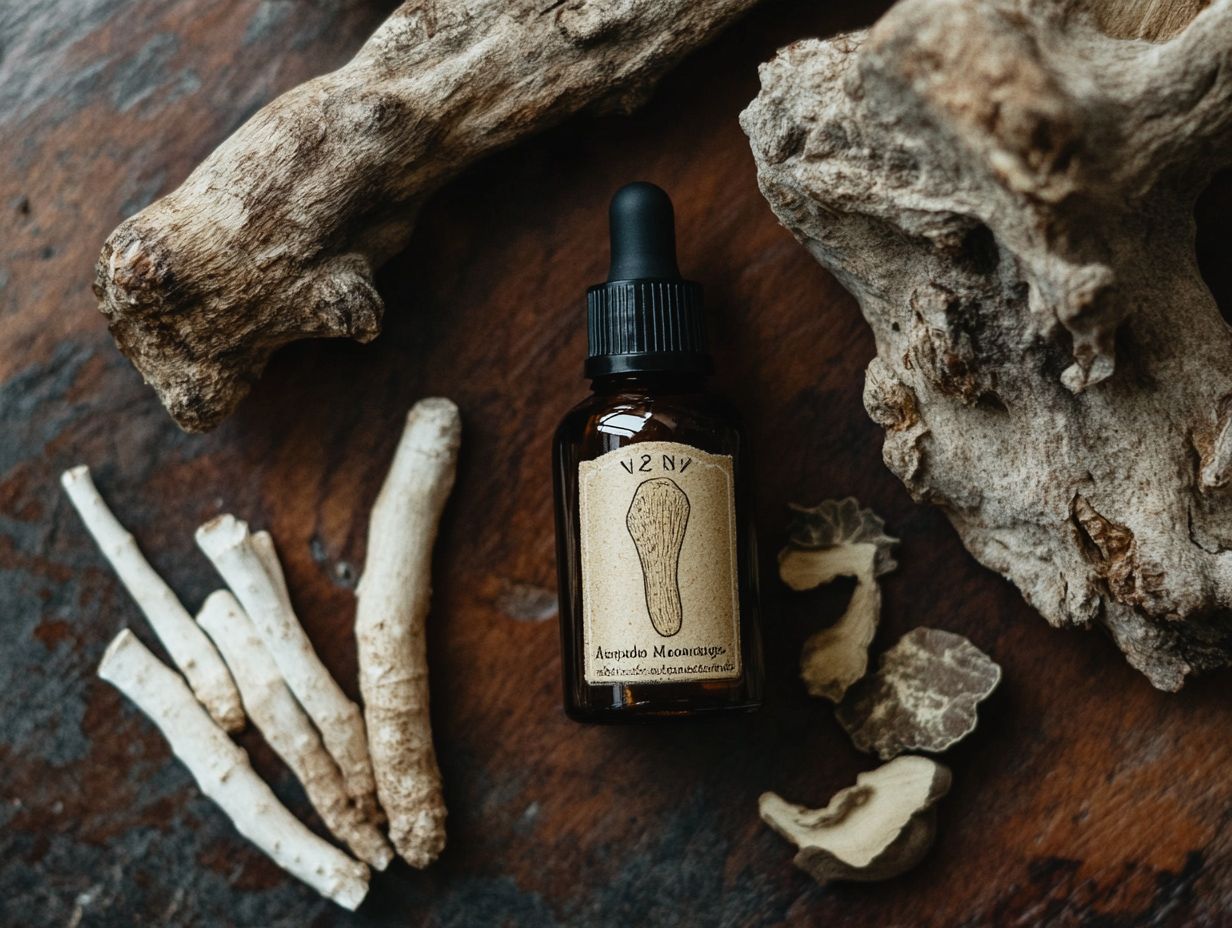
Adaptogens are recognized for their ability to provide stress relief by regulating the body’s response to stressors and enhancing immune support through their unique properties.
These remarkable herbs primarily function by balancing the adrenal system, which is crucial in the body’s stress response. By modulating the production of stress hormones such as cortisol, adaptogens assist in reducing anxiety levels and promoting resilience in the face of everyday challenges.
For example, I often turn to ashwagandha, a well-known adaptogen in Ayurvedic medicine, traditionally used to combat fatigue and anxiety. Similarly, rhodiola rosea is noted for its capacity to enhance physical endurance and mental clarity. Ginseng, often referred to as the king of herbs, supports overall vitality and has been utilized for centuries to strengthen the immune system.
This highlights how adaptogens can synergistically improve both mental well-being and physical health.
How to Incorporate Adaptogens into Your Skincare Routine
Incorporating adaptogens into my skincare routine can significantly enhance skin health. This can be achieved through various cosmetic applications and topical formulations specifically designed to harness their beneficial properties.
Recommended Adaptogens and Usage Tips
Some of the most recommended adaptogens for skincare that I have encountered include Withania somnifera, Panax ginseng, and Eleutherococcus senticosus. Each of these offers unique benefits and practical tips for effective incorporation into a skincare routine.
Withania somnifera, commonly known as ashwagandha, is particularly celebrated for its antioxidant properties. It helps combat skin aging and promotes a youthful glow. I find that it can be effectively utilized in creams or oils, with a typical dosage of 1-2% in formulations.
Panax ginseng, recognized for its energizing effects, significantly boosts blood circulation and revitalizes dull skin, making it an excellent ingredient for serums. A concentration of 0.5-1% is generally effective.
Similarly, Eleutherococcus senticosus, or Siberian ginseng, can enhance skin resilience and reduce stress-induced inflammation. I recommend incorporating it as an extract in topical applications at a concentration of 1-3% for impressive results.
Collectively, these adaptogens can elevate skincare products into powerful treatments that support overall skin health and vitality.
Potential Risks and Side Effects
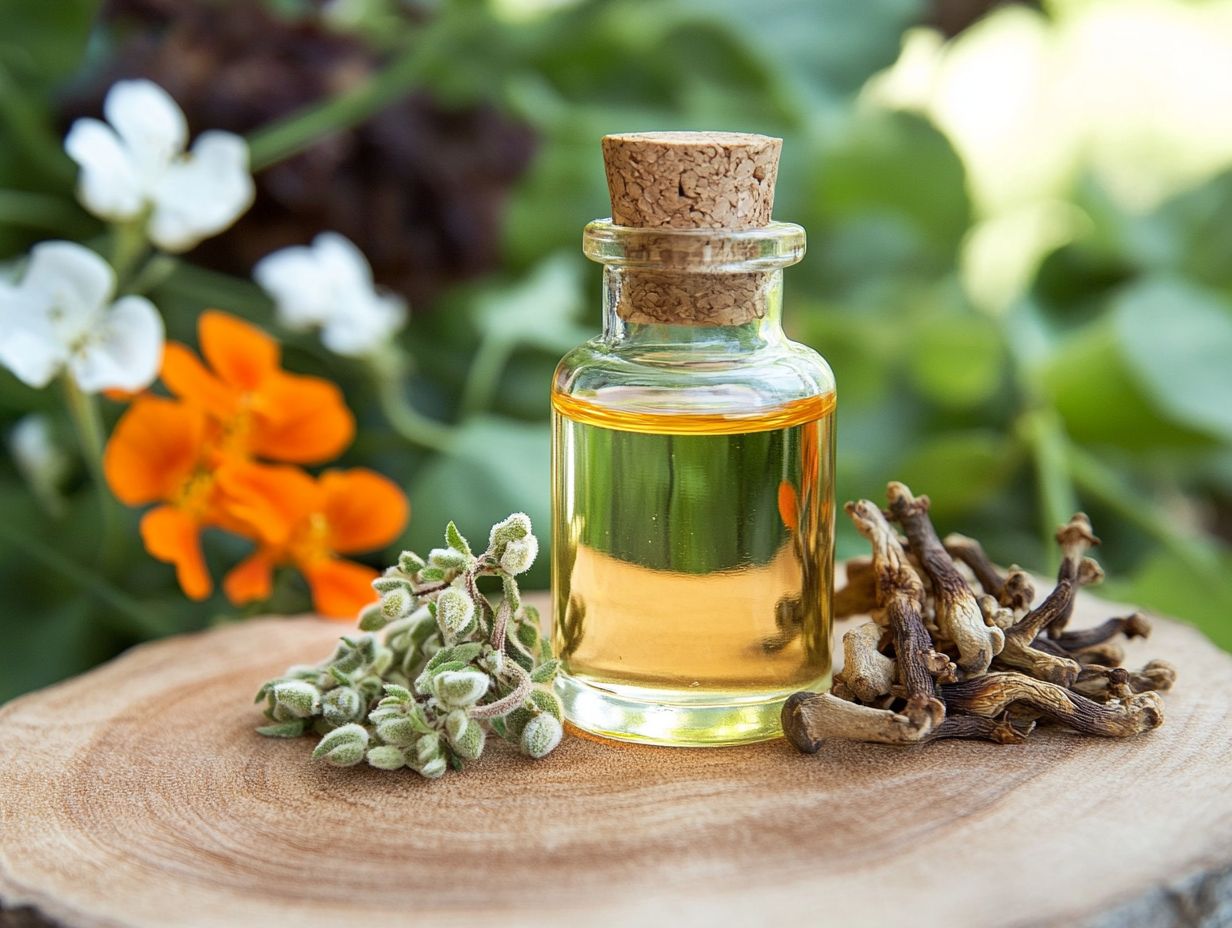
While I recognize that adaptogens are generally considered safe, I also understand the importance of being aware of potential risks and side effects.
It is essential to adhere to recommended precautions to ensure their safe usage.
Precautions and Warnings
Taking precautions and being aware of warnings is essential when using adaptogens, as I recognize that some individuals may experience adverse reactions or interactions with other medications, which requires careful consideration.
It is crucial for me to assess my individual health circumstances before introducing any herbal supplements into my routine. I understand that special care should be taken by pregnant or breastfeeding individuals, those with autoimmune conditions, or anyone currently on medication, as these adaptogens may exacerbate certain health issues or negatively interact with prescribed treatments.
Monitoring for signs such as increased anxiety, digestive distress, or unusual fatigue can help me determine if the adaptogens are suitable for my use. Safety remains a cornerstone of herbal practices; therefore, seeking guidance from healthcare professionals is essential for ensuring a well-informed and secure incorporation of these natural remedies into my daily life.
The Power of Adaptogens for Skin Health
The power of adaptogens for skin health stems from their ability to enhance collagen production and provide anti-inflammatory benefits, which makes them a valuable asset in cosmetic applications. These unique compounds, derived from plants that have evolved to withstand environmental stressors, possess remarkable properties that can help revitalize the skin’s structure and appearance.
By incorporating adaptogens into my skincare routine, I have observed improvements in elasticity and hydration, as these ingredients promote a balanced response to stressors that often contribute to premature aging. Their capacity to modulate inflammatory processes is particularly beneficial, as adaptogens can effectively reduce redness and irritation, which are common concerns for those with sensitive skin types.
As more research emerges, the future potential of adaptogens in dermatology and skincare appears promising. This likely paves the way for innovative treatments that harness their natural benefits, ultimately supporting optimal skin health.


